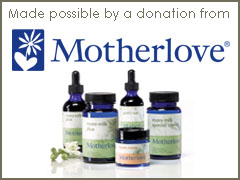Booby Traps Series: What part of “six months of exclusive breastfeeding” don’t our providers understand?
by Tanya Lieberman, IBCLC | September 12, 2012 6:21 am
 This post is the 55th in a series on Booby Traps, made possible by the generous support of Motherlove Herbal Company.
This post is the 55th in a series on Booby Traps, made possible by the generous support of Motherlove Herbal Company.
Have you heard any of these statements at your four or five month well child visit?
“She looks great! Ready to start solids?”
“Won’t sleep through the night? Try some cereal in a bottle.”
“If he’s still feeding really often, maybe it’s time to start solids.”
“Her growth seems to be slowing (looking at CDC or older growth chart). Why don’t you add some formula or start solids?”
 If you heard any of these statements at your baby’s four or five month visit, you aren’t alone. And it’s actually not that surprising, given what the research says about how pediatricians view exclusive breastfeeding, which I’ll describe in a minute.
If you heard any of these statements at your baby’s four or five month visit, you aren’t alone. And it’s actually not that surprising, given what the research says about how pediatricians view exclusive breastfeeding, which I’ll describe in a minute.
But first, why do we care that babies are breastfed exclusively to 6 months, as recommended by the American Academy of Pediatrics (AAP), the American College of Obstetricians and Gynecologists, the American Academy of Family Physicians, the Academy of Breastfeeding Medicine, the World Health Organization, and the United Nations Children’s Fund?
In their breastfeeding policy, the AAP explains:
Support for this recommendation of exclusive breastfeeding is found in the differences in health outcomes of infants breastfed exclusively for 4 vs 6 months, for gastrointestinal disease, otitis media, respiratory illnesses, and atopic disease, as well as differences in maternal outcomes of delayed menses and postpartum weight loss.
Compared with infants who never breastfed, infants who were exclusively breastfed for 4 months had significantly greater incidence of lower respiratory tract illnesses, otitis media, and diarrheal disease than infants exclusively breastfed for 6 months or
longer. When compared with infants who exclusively breastfed for longer than 6 months, those exclusively breastfed for 4 to 6 months had a fourfold increase in the risk of pneumonia.
In spite of this, a survey of pediatricians conducted in 2004 found that nearly 30% of pediatricians routinely recommended the introduction of solid foods or formula for exclusively breastfed infants before 5 months of age. This figure was unchanged since the prior survey in 1995. And while 74% of pediatricians reported recommending exclusive breastfeeding in the first month, one in four either recommended exclusive formula feeding (3%), breastfeeding and formula (8%), or had no opinion at all (16%).
This is reflected in mothers’ own reports of what they think their providers recommend. Data from the CDC’s Infant Feeding Practices II study show that only 34% of mothers believe that their doctor favors exclusive breastfeeding, and nearly an equal number (32%) said that they believed that their doctor had no preference for breastfeeding or formula feeding at all.
The problem, of course, is compounded by the slow adoption of the World Health Organization’s growth charts. Use of outdated growth charts, based on formula fed and mixed fed growth patterns, can make a normally growing exclusively breastfed baby appear to be slowing down, resulting in recommendations to supplement or start solids before six months.
As Dr. Lori Feldman-Winter pointed out in my interview with her, pediatrician training is part of the problem: “Clearly, the lack of training [on breastfeeding] makes for pediatricians who are not supportive – particularly if mothers have problems, have poor attitudes, don’t think exclusive breastfeeding can work out for many women.”
But as the 2004 survey of pediatricians shows, those doctors who have had personal experience breastfeeding (a number on the rise) are more likely to make evidence-based recommendations and more likely to believe that breastfeeding is “worth it” and possible for almost all women. This, coupled with better training in residency, shows that there is in fact hope.
Did your pediatrician support exclusive breastfeeding to six months?
Source URL: http://www.bestforbabes.org/booby-traps-series-what-part-of-six-months-of-exclusive-breastfeeding-dont-our-providers-understand